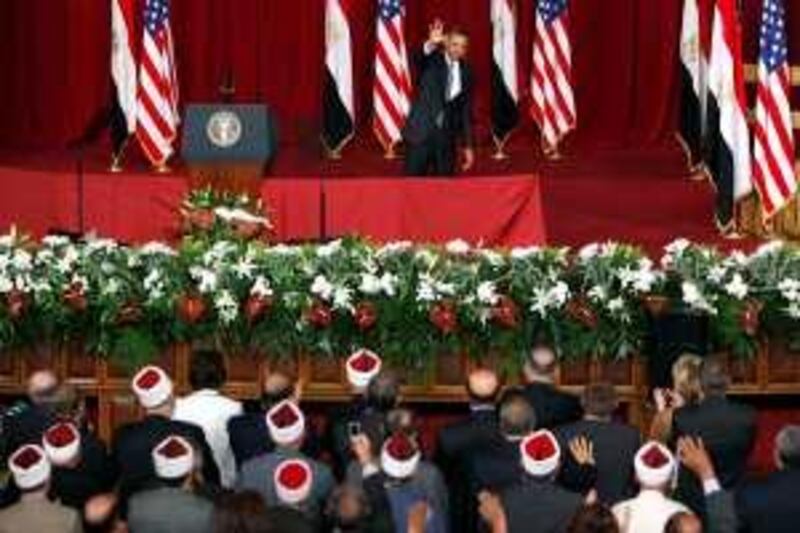Few things excite and inspire a technology reporter as much as talking to entrepreneurs. Big companies may have the reach and the resources to take on the biggest of challenges, but it is start-ups that change the world, and we all know it. But in the Middle East, full of energy and possibility and wealth, there are few things more disheartening than the lack of investment into this most exciting breed of businesses.
Speak to enough technology entrepreneurs in the region and it quickly becomes clear that almost no one in the Middle Eastern financial world is taking investment in start-up technology very seriously. Most entrepreneurs in the Middle East get their early funding from family and friends. If they are lucky, they find a wealthy businessman willing to put a roof over their heads. Surely this situation must change. In agreement with this sentiment are, among others, a Jordanian princess, an American president and some of the brightest young minds in the Arab world.
All are saying the same thing: that investments in property, stock markets and heavy industry, while strategic and profitable, need to be supplemented by another economic pillar of growth. Emile Cubeisy, who runs IV Holdings, one of the Middle East's few venture capital funds for technology companies, points out that without seed capital to enable a company to get going, there can be no enterprise for other investors to make money out of later. "Value is created in stages, and if the venture stage is missing, the private equity guys will have nothing to play with years from now."
If you think a venture capitalist calling for more venture capital investment may be a conflict of interest, then perhaps the words of Barack Obama, the US president, addressing the Muslim world from Cairo University last week, carry a little more weight. "No development strategy can be based only upon what comes out of the ground, nor can it be sustained while young people are out of work," he said.
"Many Gulf states have enjoyed great wealth as a consequence of oil, and some are beginning to focus it on broader development. But all of us must recognise that education and innovation will be the currency of the 21st century." And if an American trying to win popularity in a foreign land is not enough, consider the views of Princess Sumaya of Jordan, who leads some of the country's most ambitious technological development initiatives.
"Our region must move from a culture of consumption to production," she said in a speech last week. "The source of innovation is simple: talent." If the region does not invest in its talent and its entrepreneurs, it will never make that move, Princess Sumaya said, calling for a strategic regional push for investment into new technology in areas such as energy, water and health. The Gulf's sovereign wealth funds, with more than a trillion dollars under management, are not meant for this type of investment. Their purpose is to safeguard and grow enormous amounts of savings. Moreover, their size makes investments in the US$1 million (Dh3.67m) to $3m range, a typical venture investment sum, too small to administer.
Strategic funds, such as Abu Dhabi's Mubadala Development or the Qatar Foundation, are a step in the right direction, willing to invest in long-term nation building projects that may not produce quick financial returns. In addition, government initiatives such as Qatar's Education City and Abu Dhabi's Guggenheim museum show a willingness to direct oil money into investments that produce social and cultural, rather than purely financial, results.
But again, size matters. Even for these strategic funds, ventures in websites, mobile phone technology or software are too small. The most effective venture capitalists are specialists, investors who live and breathe the same ideas and markets as the ventures they back. They spend time mentoring those new businesses, opening doors to new opportunities and connecting the entrepreneurs they back with others in their industry.
What are needed are specialised venture funds. The amount of money needed is, by regional standards, small change: the largest technology fund in the Middle East today is Intel Capital, endowed with $50m. Accelerator, based in Jordan, works with less than half as much, and has backed five technology start-ups in recent years. Nevertheless, the return on such investments can be transformational. In Jordan, the iPark technology incubator, which provides office space and support services to small technology start-ups, has "graduated" 18 companies into the market in the past six years. The companies now employ more than 600 young skilled professionals.
With running costs of about $100,000 a year, that means purely as a job creation strategy, iPark costs just $1,000 per job, said Wissam Rabadi, its director. In a region where millions of young graduates enter the workforce every year, and multinational companies are regularly given millions of dollars in incentives to establish local operations, this is stunningly cost effective. Today, you can count the number of technology venture funds in the Middle East on one hand and still have a couple of fingers left over.
The first signs of a new wave of such funds are emerging, but this is still an industry in its infancy. We need it to grow up, fast. Omar Koudsi, who co-founded Jeeran, one of the region's most successful internet businesses, said searching for investors in the first half of the decade was one of the biggest challenges for his business. The company now employs 43 young people in its Amman offices, thanks in part to investments from both IV Holdings and Intel Capital. Before the two companies came on board, the outlook was grim.
"We really knew we were doing something special, but we couldn't find anyone to talk to," he said. "We couldn't even get rejected, because there was no one we could find to reject us." tgara@thenational.ae





